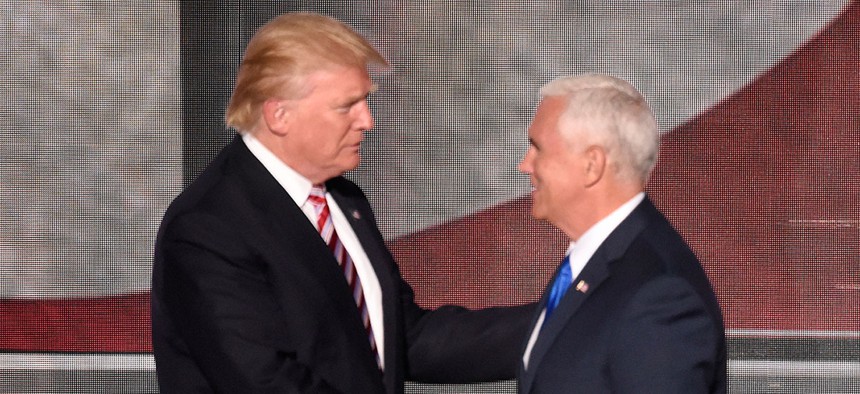
Ida Mae Astute/ABC via Flickr
Even Trump's Staunchest Defenders Won't Back His Wiretap Claim
Vice President Mike Pence declined to say whether he thought the president’s allegation is true, while the White House press secretary has insisted he won’t discuss the matter at all.
Donald Trump’s ability to make outlandish claims is not unusual; after all, if you’re unconstrained by facts or evidence, there’s no limit to the claims you can make. His success has depended on convincing other people to agree with, or at least to publicly back his claims. Mexico will pay for the wall? Sure. Widespread voter fraud? Of course. Terrorist attacks in Sweden? Why not?
But for once, the president seems to have made a claim that even his staunchest defenders—including those whose job is to do so—are unwilling to stand behind: his allegation that Barack Obama “had my ‘wires tapped’ just before the victory.”
During an interview with Cleveland TV station WEWS on Wednesday, Vice President Mike Pence was questioned on the allegation. Reporter John Kosich (no, not a typo, and not the governor), asked, “Yes or no—do you believe that President Obama did that?”
Pence declined to answer directly. “Well, what I can say is that the president and our administration are very confident that the congressional committees in the House and Senate that are examining issues surrounding the last election, the run-up to the last election, will do that in a thorough and equitable way. They'll look at those issues, they'll look at other issues that have been raised.”
In short, if Pence believes the allegations are true, he’s unwilling to say it. Or else Pence recognizes that the accusation is unfounded, and sees little upside in antagonizing the intelligence community and signing on to what looks at the moment like a conspiracy theory.
Pence isn’t the only tight-lipped member of the Trump administration. Since Trump’s outburst on Twitter on Saturday, Press Secretary Sean Spicer has tried to sidestep the matter time and again. On Sunday, the White House issued a statement saying that “Neither the White House nor the President will comment further until such oversight is conducted,” as though Trump himself had not opened the can of worms and set it out on the counter.
On Monday, during an off-camera press briefing, he told reporters, “I'm just going to let the tweet speak for itself.” This is a puzzling response for a couple of reasons. The first is that the tweets don’t remotely speak for themselves: They lodge an extremely serious accusation without any semblance of evidence or even explanation for how Trump “just found out” about the alleged wiretapping. The second is that it is literally Spicer’s job to speak for the president.
On Tuesday, reporters tried again, and Spicer again pointed to the statement saying the White House would not comment. They asked why, if the president had evidence of a wiretap, he couldn’t just say so, to which Spicer offered a hand-waving claim that it would violate separation of powers, though he did not explain why the executive branch disclosing information about the executive branch would be a violation. Eventually, reporters asked Spicer whether he himself believed Obama had ordered a wiretap, a question he also declined to answer.
The reaction to Trump’s accusation followed an interesting arc. The first wave was, Look at the latest craziest thing the president has said! The second wave went something like, Well, but actually ... The Obama years showed the vast amounts of data intelligence agencies were sweeping up. Even if Obama did not order a wiretap on Trump, it’s possible that Trump could have been swept up in an investigation of contacts between his team and the Russian government. Analysts parsed denials by various Obama and intelligence officials, looking for ways their answers might leave loopholes. The fact that former Director of National Intelligence James Clapper, who appears to have misled Congress and the public about spying, was one of those making the denials made them ripe for nitpicking.
But on Wednesday, Spicer threw cold water on many of those ideas, saying both that “there is no reason to believe that [Trump] is the target of any investigation” and that “there is no reason to believe that there is any type of investigation with respect to the Department of Justice.”
As Mark Landler of The New York Times summed it up, these denials create a tricky choice: “Either the president’s assertions are baseless, or he may have implicated himself in a government investigation of contacts between his presidential campaign and Russia.” There is, one supposes, a third, highly unlikely scenario, which is that Obama has a private team of spies, a la the Watergate plumbers, conducting wiretaps on his personal behalf, something Trump suggested by tweeting, “This is Nixon/Watergate.” But no one has offered any evidence of that, either.
Based on a previous pattern, where Trump’s tweets can often be traced to a news report in one of a few conservative outlets, there’s been wide speculation that Trump “found out” about the wire taps was from the conservative radio host Mark Levin and stories in Breitbart. The unwillingness of figures like Pence and Spicer to stand behind Trump’s allegations, and the White House’s refusal to provide any sort of evidence, only makes this theory look more likely, and Trump’s claims that much more unwise. Perhaps the White House won’t reveal its evidence because all it has is a Breitbart clip.
Despite his reluctance to speak about Trump’s allegations, Spicer may have unintentionally offered the most incisive commentary on the case during Tuesday’s briefing, when he was asked why the White House wouldn’t just share what it knows.
“It’s a no-win situation,” Spicer replied. Who can argue with that?
NEXT STORY: Play of the Day: Health Care and Paper Stacks






